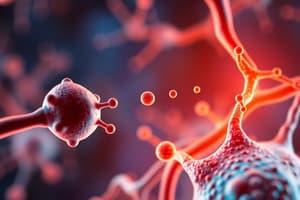Podcast
Questions and Answers
Which of the following drugs is a synthetic opioid that is 100 times more potent than fentanyl?
Which of the following drugs is a synthetic opioid that is 100 times more potent than fentanyl?
- Valium
- Morphine
- Carfentanil (correct)
- Heroin
Which of the following is a common long-term effect of drug use that involves the body adjusting to the presence of the drug?
Which of the following is a common long-term effect of drug use that involves the body adjusting to the presence of the drug?
- Oral digestion
- Neural sensitization
- Neurotoxicity
- Receptor down-regulation (correct)
Which of the following drugs acts by binding to GABA receptors and amplifying the effects of GABA?
Which of the following drugs acts by binding to GABA receptors and amplifying the effects of GABA?
- Haloperidol
- Amphetamine
- Benzodiazepines (e.g., Xanax, Valium) (correct)
- Morphine
Which of the following is the fastest route for a drug to reach the brain?
Which of the following is the fastest route for a drug to reach the brain?
Which of the following is a potential long-term effect of amphetamine use?
Which of the following is a potential long-term effect of amphetamine use?
Which of the following drugs acts by blocking D2 dopamine receptors, preventing dopamine from activating these receptors?
Which of the following drugs acts by blocking D2 dopamine receptors, preventing dopamine from activating these receptors?
Which neurotransmitter is primarily involved in the 'fight or flight' response?
Which neurotransmitter is primarily involved in the 'fight or flight' response?
Which neurotransmitter is primarily involved in the regulation of mood and happiness?
Which neurotransmitter is primarily involved in the regulation of mood and happiness?
Which of the following is an example of a presynaptic agonist?
Which of the following is an example of a presynaptic agonist?
Which of the following is a retrograde messenger?
Which of the following is a retrograde messenger?
Which neurotransmitter is primarily involved in the regulation of movement, reward-seeking, and motivation?
Which neurotransmitter is primarily involved in the regulation of movement, reward-seeking, and motivation?
Which of the following is an example of an antagonist?
Which of the following is an example of an antagonist?
Flashcards are hidden until you start studying
Study Notes
-
Postsynaptic agonists like morphine and heroin activate opioid receptors, leading to euphoria and pain relief by mimicking endorphins and enkephalins.
-
Synthetic opioid drugs like Fentanil and Carfentanil are potent pain relievers but can cause overdose by inhibiting brainstem breathing circuits.
-
Benzodiazepines such as Xanax and Valium bind to GABA receptors, amplifying GABA effects and providing sedative, hypnotic, and antiepileptic properties.
-
Antipsychotic drugs like Haloperidol for schizophrenia block D2 dopamine receptors, preventing dopamine activation and helping with symptoms.
-
Drugs can reach the brain through oral digestion (slow but easy to administer), injection (fast), or inhalation (fastest but hard to control diffusion).
-
Long-term effects of drugs include receptor down-regulation leading to tolerance, neural sensitization causing hyper-responsiveness and addiction, and neurotoxicity like dopamine depletion from amphetamines.
-
Catecholamines like epinephrine and norepinephrine function in fight-or-flight responses, acting as neurotransmitters and hormones with widespread effects.
-
Dopamine is crucial for movement, reward-seeking, and motivation, produced in specific brain regions like the substantia nigra and VTA.
-
Serotonin, the "happiness neurotransmitter," is increased by antidepressants and plays a role in mood regulation and happiness.
-
Opioids like endorphins and enkephalins provide pain relief, euphoria, and reward by activating mixed EPSPs and IPSPs in the brain.
Studying That Suits You
Use AI to generate personalized quizzes and flashcards to suit your learning preferences.




